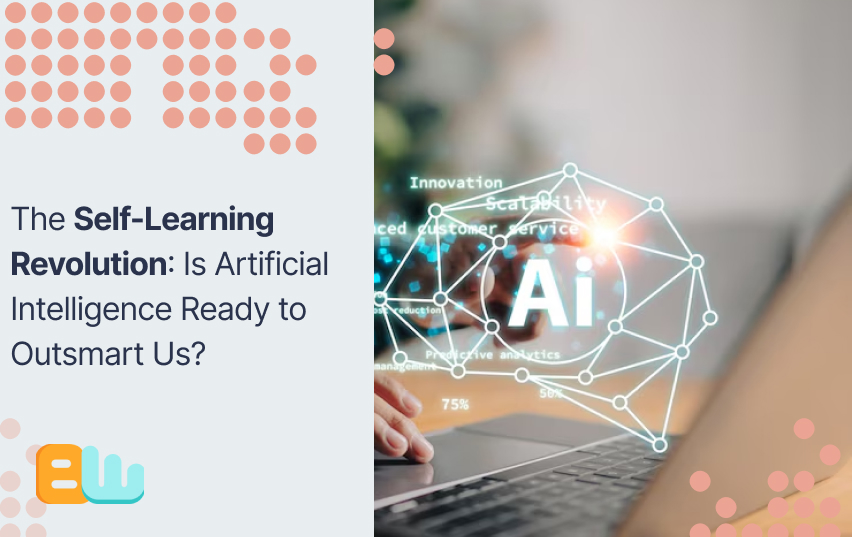
Artificial intelligence (AI) has become a buzzword in recent years, capturing the imagination of technologists and the general public. It promises to bring about a profound change in how we live and work, potentially creating a new world where machines are not only intelligent but also capable of outsmarting us. This self-learning revolution is driven by advancements in machine learning, neural networks, and deep learning, which have enabled AI systems to learn and improve their performance continuously.
While the idea of machines surpassing human intelligence may sound like science fiction, there are already instances where AI has exceeded human capabilities. From playing complex games like chess and Go to diagnosing diseases and translating languages, AI has demonstrated its potential to outperform humans in specific tasks.
However, the question remains: Is AI ready to outsmart us in all aspects of human intelligence? In this blog, we will explore the evolution of self-learning AI, the critical breakthroughs that have shaped the modern era of AI, the instances where AI has exceeded human capabilities, the limitations of current AI technologies, and the ethical considerations and impact of self-learning AI on various industries. Let’s dive in and uncover the potential of AI to outsmart us.
The Dawn of Self-Learning AI: An Overview
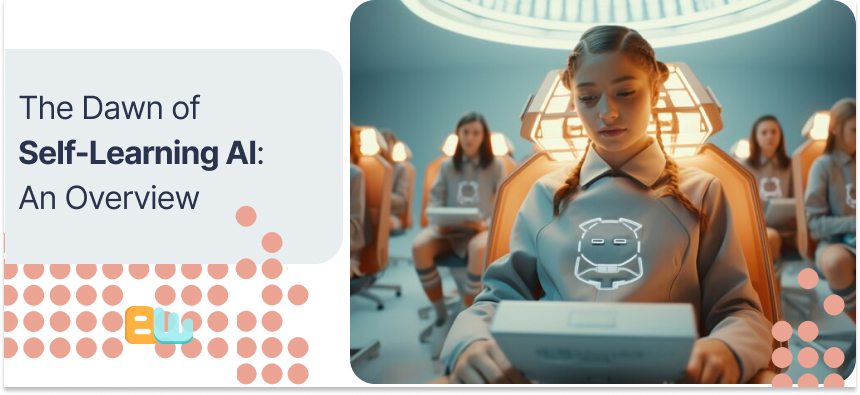
The development of self-learning artificial intelligence (AI) marks a significant milestone in the evolution of AI. AI systems are no longer limited to following pre-programmed instructions but can continuously learn and improve their performance through machine learning and neural networks. This evolution has been driven by significant advances in computational power and breakthroughs in computer science, paving the way for the modern era of AI. Let’s delve deeper into the concept of self-learning AI and explore its implications.
Defining Self-Learning Artificial Intelligence
Self-learning artificial intelligence (AI) refers to AI systems that continuously learn and improve performance without explicit programming. This ability is achieved through machine learning algorithms and neural networks, which enable AI systems to analyze large amounts of data, identify patterns, and make predictions or decisions based on that data. By constantly adapting and evolving, self-learning AI systems can become more accurate and efficient. This capability has opened up new possibilities in various domains, such as image recognition, natural language processing, and predictive analytics.
Historical Milestones in AI Development
The development of artificial intelligence (AI) has been marked by several historical milestones that have contributed to its evolution and advancement. One of the key factors driving the progress in AI is the exponential growth in computational power, which has enabled AI systems to process large amounts of data and perform complex calculations faster. Additionally, significant advances in computer science, such as the development of machine learning algorithms and neural networks, have paved the way for the modern era of AI.
Critical Breakthroughs in AI That Shaped the Modern Era
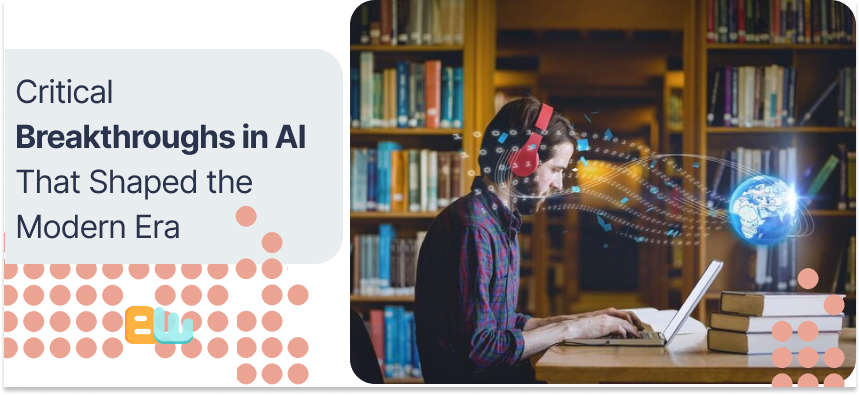
In the modern era of artificial intelligence (AI), critical technological breakthroughs have shaped the capabilities of AI systems and their potential to outperform human intelligence. Two essential breakthroughs of AI are deep learning and natural language processing (NLP). Deep learning enables AI systems to learn from large amounts of data and make complex decisions or predictions. On the other hand, NLP allows AI systems to understand and generate human language, opening up possibilities for communication and interaction between humans and machines.
Deep Learning and Neural Networks
Deep learning is a subset of artificial intelligence (AI) that focuses on training neural networks to learn from large amounts of data and make accurate predictions or decisions. Neural networks are the building blocks of deep learning, mimicking the structure and functionality of the human brain. Using multiple layers of interconnected nodes, neural networks can process complex data and extract meaningful patterns or features. This ability to learn and adapt from data sets, deep learning apart, enables AI systems to achieve a level of intelligence that can surpass human capabilities in specific domains.
Natural Language Processing Achievements
Natural language processing (NLP) is a branch of artificial intelligence (AI) that focuses on enabling computers to understand, interpret, and generate human language. NLP has made significant achievements in recent years, allowing AI programs to process and analyze textual data, understand context, and develop meaningful responses. This capability has opened up new possibilities for communication and interaction between humans and machines. AI programs like ChatGPT use NLP to provide literate answers and carry on conversations that are often difficult to distinguish from discussions between two humans.
AI Outsmarting Humans: Reality or Sci-Fi?
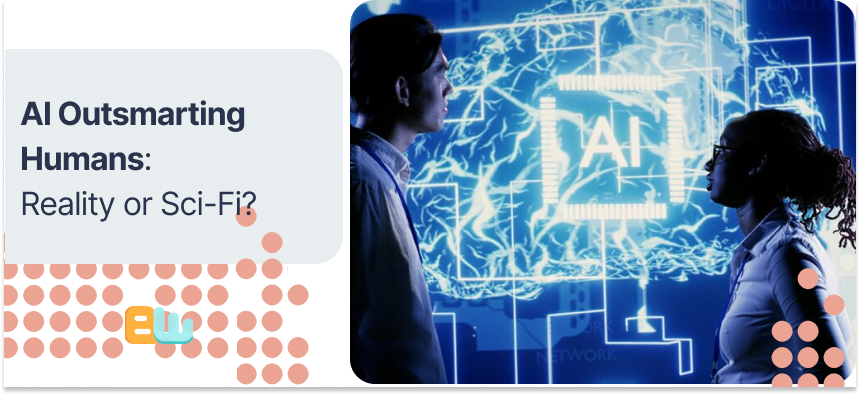
The idea of artificial intelligence (AI) outsmarting humans has long been a topic of speculation and fascination in science fiction. Concepts like artificial general intelligence (AGI), which refers to AI systems that can match or exceed human intelligence in all aspects, have fueled the imagination of writers and filmmakers. However, whether AI can truly outsmart humans remains debated and explored. While AI has made impressive achievements in specific domains, replicating the complexity and capabilities of the human brain is a significant challenge. Let’s explore instances where AI has exceeded human capabilities and the limitations of current AI technologies.
Instances Where AI Has Exceeded Human Capabilities
Artificial intelligence (AI) has surpassed human intelligence in specific tasks and domains. For example, AI systems have demonstrated superior performance in chess and Go, defeating world champions and showcasing their ability to analyze complex data and make strategic decisions. AI has also made significant achievements in fields like healthcare, where it can accurately diagnose diseases and recommend personalized treatments. These instances highlight the potential of AI to outperform humans in specific areas of expertise.
Limitations of Current AI Technologies
While artificial intelligence (AI) has achieved remarkable feats, its limitations still prevent it from outsmarting human intelligence across all domains. Current AI technologies are primarily focused on narrow applications and need more general intelligence and adaptability of human beings. AI systems are designed to perform specific tasks and are limited by the data they have been trained on. They need to gain the common sense reasoning and intuitive understanding that humans possess. Additionally, AI systems are susceptible to biases and may make incorrect or biased decisions based on the data they have been exposed to.
Ethical Considerations in the Age of Intelligent Machines
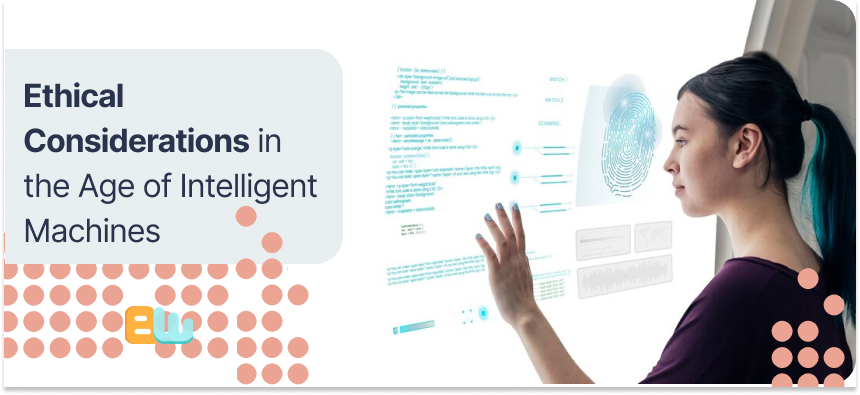
The rise of intelligent machines and artificial intelligence (AI) has raised ethical considerations that must be addressed. AI systems have the potential to make decisions and take actions that can impact human lives, raising questions about the moral implications of their behavior. It is crucial to ensure that AI systems are aligned with human values and adhere to ethical standards. Privacy concerns also come into play, as AI systems can collect and analyze vast amounts of data, raising questions about data security and individual privacy.
The Debate on AI Consciousness and Sentience
One of the ongoing debates in artificial intelligence (AI) revolves around the concept of AI consciousness and sentience. Can AI systems develop self-awareness and subjective experiences? Can they possess free will and make autonomous decisions? While some argue that AI can never possess consciousness or sentience due to its lack of biological life, others believe AI systems can exhibit behaviors resembling consciousness and sentience. The debate on AI consciousness raises philosophical and ethical questions about the nature of intelligence and the potential consequences of creating sentient machines.
Privacy and Security Concerns in AI Applications
The widespread use of artificial intelligence (AI) applications raises significant privacy and security concerns. AI systems can collect and analyze vast amounts of data, raising questions about data privacy and how personal information is used and protected. Additionally, AI systems can be vulnerable to cyberattacks and malicious use, posing risks to the security and integrity of the systems and the data they process. Establishing robust privacy and security measures to safeguard individuals’ data and ensure the responsible use of AI technologies is crucial. This includes implementing data protection regulations, providing encryption and secure data storage, and establishing ethical guidelines for using AI systems.
The Impact of Self-Learning AI on Various Industries
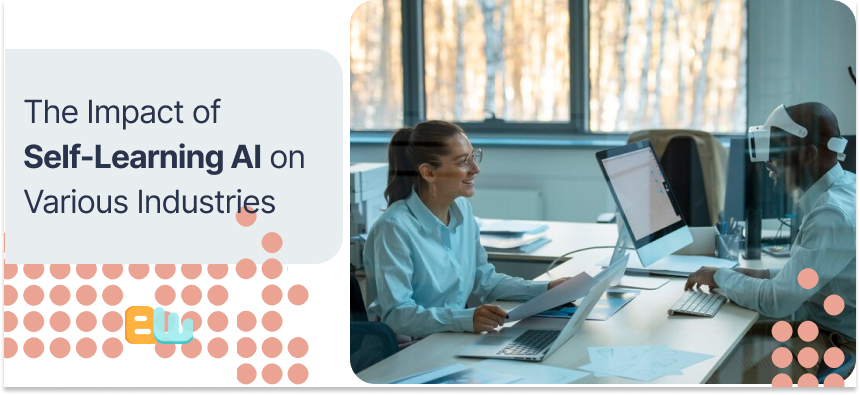
Artificial intelligence (AI) ‘s self-learning capabilities can transform various industries. AI enables predictive analytics, allowing organizations to make data-driven decisions and anticipate future trends. AI can improve diagnostics, personalize treatments, and enhance patient care in healthcare. AI can optimize investment strategies, detect fraud, and automate customer service in finance. Other industries, such as manufacturing, transportation, and retail, can benefit from AI’s ability to optimize processes, improve efficiency, and enhance customer experiences. The impact of self-learning AI is already being felt, and it is expected to continue reshaping industries and creating new opportunities for innovation and growth.
Revolutionizing Healthcare with Predictive Analytics
AI is revolutionizing the healthcare industry through predictive analytics. By analyzing large volumes of patient data, AI systems can identify patterns and trends to help healthcare providers make more accurate diagnoses and treatment plans. This can lead to improved patient care and outcomes. Predictive analytics can also help identify patients at risk of developing certain conditions or complications, allowing for early intervention and preventive measures. AI-powered systems can also assist healthcare professionals in managing patient flow, optimizing resource allocation, and reducing healthcare costs.
Transforming Education Through Personalized Learning
In education, AI is transforming traditional teaching methods through personalized learning. AI-powered systems can adapt to students’ needs and learning styles, providing tailored instruction and feedback. This customized approach to education can significantly enhance student engagement and understanding. AI tutoring systems, for example, can analyze student performance data and identify areas of weakness, providing targeted support and guidance. This helps students improve academic performance and promotes self-directed learning and critical thinking skills.
Conclusion
Self-learning AI is rapidly evolving, challenging human capabilities. While it has limitations, AI’s impact on healthcare, education, and various industries is undeniable. Ethical concerns like privacy and consciousness arise as AI advances. Preparing for an AI-dominant future becomes crucial as we navigate this futuristic landscape. Understanding AI’s potential benefits and risks is critical to ensuring a balanced societal integration. Stay informed, engage in discussions, and explore proactive measures to harness AI’s potential responsibly. Embrace the self-learning revolution with a cautious yet optimistic outlook toward a technology-driven future.
